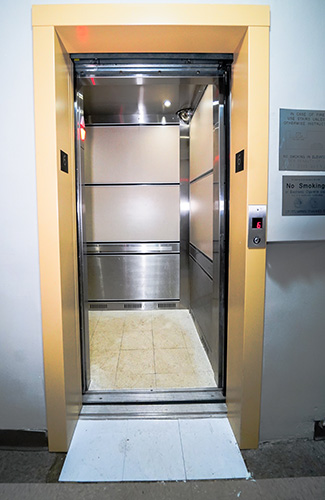24/7 Elevator maintenance, combined with proactive care and rapid response are crucial in buildings to ensure safety and prevent breakdowns.
By Jack O’Shea, Start Elevator
Elevators are marvels of engineering that have become an indispensable part of modern life. Their smooth operation often goes unnoticed – until something goes wrong.
When several LA Chargers players recently found themselves trapped in a hotel elevator, resorting to crawling through the ceiling to escape, it wasn’t just an inconvenience—it was a stark reminder of the potential dangers lurking in poorly maintained elevator systems. This high-profile incident serves as a wake-up call for building owners, managers, and the public alike, highlighting the urgent need for robust preventative maintenance and round-the-clock repair services.
Elevator failures extend far beyond mere inconvenience. They can compromise guest safety and comfort in hotels and residential buildings, disrupt business operations in commercial spaces, and create accessibility issues for individuals with mobility challenges. Such incidents can potentially damage a property’s reputation and customer satisfaction levels. In today’s fast-paced world, where time is of the essence and safety is paramount, a malfunctioning elevator can quickly escalate from a minor annoyance to a major crisis.
Many building owners and managers fall into the trap of reactive maintenance—addressing issues only when they become apparent. This approach, while seemingly cost-effective in the short term, often leads to more frequent breakdowns, shorter equipment lifespan, and significantly higher repair costs in the long run.
Preventative maintenance offers a proactive solution to elevator upkeep. Regular inspections, timely replacement of worn parts, and systematic maintenance can extend the lifespan of elevator systems, reduce the frequency of breakdowns and emergency repairs, enhance overall safety and reliability, minimize downtime and disruptions, and lower long-term maintenance costs.
Even with the most rigorous preventative maintenance, unforeseen issues can arise. This is where the importance of 24/7 repair services comes into play. Round-the-clock availability ensures that emergencies are addressed promptly, minimizing potential safety risks. It helps keep disruptions to building operations to a minimum and prevents occupants and visitors from being left stranded or inconvenienced for extended periods. Immediate response capability also helps prevent minor issues from escalating into major problems, allowing building managers to maintain peace of mind, knowing that expert help is always available.

The elevator industry is constantly evolving, with new technologies emerging to enhance safety, efficiency, and reliability. Noteworthy innovations include predictive maintenance systems using IoT sensors and AI algorithms to predict potential failures before they occur, and remote monitoring allowing technicians to diagnose issues and sometimes resolve them without on-site visits. Energy-efficient systems can reduce power consumption and operational costs, while advanced safety features, including improved emergency communication systems and fail-safe mechanisms, can enhance overall security. Additionally, touchless and voice-activated controls improve hygiene and accessibility, especially in a post-pandemic world.
While technology plays a crucial role, the human element remains indispensable in elevator maintenance. Skilled technicians bring years of hands-on experience and problem-solving skills, the ability to perform nuanced diagnostics that machines can’t replicate, a commitment to safety and quality service, and the capacity to educate building staff on basic elevator safety and operation. Investing in ongoing training and development for maintenance personnel is as crucial as upgrading the elevator systems themselves.
Building owners and managers should work closely with elevator maintenance providers to stay abreast of these advancements and implement them where appropriate. Collaboration ensures that both technological innovations and human expertise are leveraged to their fullest potential in maintaining elevator safety and reliability.
Elevator maintenance isn’t just a matter of best practices—it’s often a legal requirement. Many jurisdictions have strict regulations governing elevator safety and maintenance schedules. Failure to comply can result in heavy fines and penalties, forced shutdown of elevator systems, legal liabilities in case of accidents or injuries, and damage to reputation and loss of insurance coverage.
While professional maintenance is crucial, building occupants and visitors also play a role in elevator safety. Educating users about proper elevator etiquette and what to do in case of emergencies can significantly enhance overall safety. This includes not overcrowding elevators or exceeding weight limits, reporting unusual noises or behaviors promptly, knowing how to use emergency communication systems, and understanding basic safety procedures in case of entrapment.
By prioritizing elevator maintenance and safety through a combination of preventative care, rapid response services, technological advancements, skilled personnel, regulatory compliance, and user education, building owners and managers not only protect their investments but also demonstrate a commitment to the well-being of all who rely on elevators. In our ever-growing urban landscapes, reliable and safe elevators are not just a convenience—they’re a necessity that underpins the very functionality of our modern world.

John “Jack” O’Shea, owner and president of Start Elevator, LLC, immigrated to America from Ireland in 1984 with just $200 and fierce determination. Starting as a mechanic’s helper, Jack honed his skills in the elevator industry before founding Start Elevator in New York City in 1992. Through tireless effort and commitment to customer service, Jack has grown the company into a trusted industry leader, now employing over 130 people across the five boroughs and surrounding areas. Start Elevator prides itself on being a family-based, independent business focused on personal relationships and reliable service. Jack’s leadership, work ethic, humility, and generosity have been instrumental in the company’s success, and he actively gives back to the community through charity support and industry involvement.
Scott Ellyson, CEO of East West Manufacturing, brings decades of global manufacturing and supply chain leadership to the conversation. In this episode, he shares practical insights on scaling operations, navigating complexity, and building resilient manufacturing networks in an increasingly connected world.